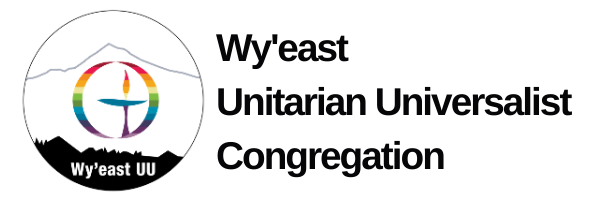What do UUs Believe?
Unitarian Universalism invites everyone to search for themselves to discover the source of wisdom.
There are seven ethical principles which Unitarian Universalist congregations affirm and promote. We hold up these principles of ethical living, while each of us must decide for ourselves why they are good. Our seven principles are:
- The inherent worth and dignity of every person;
- Justice, equity and compassion in human relations;
- Acceptance of one another and encouragement to spiritual growth in our congregations;
- A free and responsible search for truth and meaning;
- The right of conscience and the use of the democratic process within our congregations and in society at large;
- The goal of world community with peace, liberty, and justice for all;
- Respect for the interdependent web of all existence of which we are a part.
Unitarian Universalists draw inspiration from many sources:
- Direct experience of that transcending mystery and wonder, affirmed in all cultures, which moves us to a renewal of the spirit and an openness to the forces which create and uphold life;
- Words and deeds of prophetic women and men which challenge us to confront powers and structures of evil with justice, compassion, and the transforming power of love;
- Wisdom from the world's religions which inspires us in our ethical and spiritual life;
- Jewish and Christian teachings which call us to respond to God's love by loving our neighbors as ourselves;
- Humanist teachings which counsel us to heed the guidance of reason and the results of science, and warn us against idolatries of the mind and spirit.
- Spiritual teachings of earth-centered traditions which celebrate the sacred circle of life and instruct us to live in harmony with the rhythms of nature.
Our Seven Principles (Children's Version)
- Each and every person is important.
- All people should be treated fairly and kindly.
- We should accept one another and keep on learning together.
- Each person should be free to search for what is true and right in life.
- All people have the right to speak out and vote about things that concern them.
- We should work for a peaceful, free, and fair world.
- We need to take care of our planet, Earth, the home we share with all living things.
The Flaming Chalice
Worship services and Religious Education classes at Wy'east begin with the ritual lighting of the flame inside a chalice. The Flaming Chalice has become a well-known symbol of our denomination. It unites our members in worship and symbolizes the spirit of our work.
Hans Deutsch, an Austrian artist, designed the Flaming Chalice as a symbol for the Unitarian Service Committee (USC) during World War II. After escaping the Nazis, Deutsch found help in the form of food, medicine and clothing from the USC. He was so grateful for the help that he went to work for the USC and designed the symbol that was put on official documents, buildings, and trucks so that those individuals needing to escape Nazis persecution would recognize the symbol and know help was available.
The flaming chalice originally stood for a life of service. People who were willing to risk all for others in a time of urgent need.
In our services today, the chalice symbol takes many forms and has a variety of meanings. Interpretations of the flame include: the warmth of love, the light of truth, a beacon of service to humankind, the divine light within each one of us. The two overlapping circles surrounding the chalice in the UUA symbol represent the merger of Unitarianism and Universalism.
For more information about Unitarian Universalism, visit the Unitarian Universalist Association website and 100 Questions that Non-Members Ask about Unitarian Universalism.
